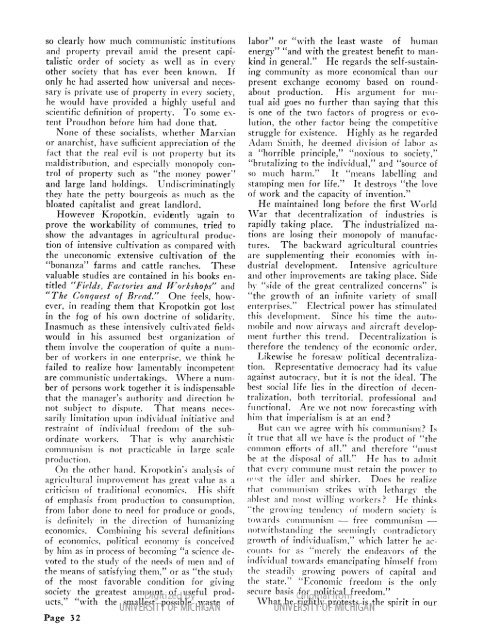Centennial Expressions on Peter Kropotkin 1842-1942.
Centennial Expressions on Peter Kropotkin 1842-1942.
Centennial Expressions on Peter Kropotkin 1842-1942.
Create successful ePaper yourself
Turn your PDF publications into a flip-book with our unique Google optimized e-Paper software.
so clearly how much communistic instituti<strong>on</strong>s<br />
and property prevail amid the present capitalistic order of society as well as in every<br />
other society that has ever been known. If<br />
<strong>on</strong>ly he had asserted how universal and necessary is private use of property in every society,<br />
he would have provided a highly useful and<br />
scientific definiti<strong>on</strong> of property. To some extent Proudh<strong>on</strong> before him had d<strong>on</strong>e that.<br />
N<strong>on</strong>e of these socialists, whether Marxian<br />
or anarchist, have sufficient appreciati<strong>on</strong> of the<br />
fact that the real evil is not property but its<br />
maldistributi<strong>on</strong>, and especially m<strong>on</strong>opoly c<strong>on</strong>trol of property such as "the m<strong>on</strong>ey power"<br />
and large land holdings. Undiscriminatingly<br />
they hate the petty bourgeois as much as the<br />
bloated capitalist and great landlord.<br />
However <strong>Kropotkin</strong>, evidently again to<br />
prove the workability of communes, tried to<br />
show the advantages in agricultural producti<strong>on</strong> of intensive cultivati<strong>on</strong> as compared with<br />
the unec<strong>on</strong>omic extensive cultivati<strong>on</strong> of the<br />
"b<strong>on</strong>anza" farms and cattle ranches. These<br />
valuable studies are c<strong>on</strong>tained in his books entitled "Fields, Factories and Workshops" and<br />
"The C<strong>on</strong>quest of Bread." One feels, however, in reading them that <strong>Kropotkin</strong> got lost<br />
in the fog of his own doctrine of solidarity.<br />
Inasmuch as these intensively cultivated fields<br />
would in his assumed best organizati<strong>on</strong> of<br />
them involve the cooperati<strong>on</strong> of quite a nunmber of workers in <strong>on</strong>e enterprise, we think he<br />
failed to realize how lamentably incompetent<br />
are communistic undertakings. Where a number of pers<strong>on</strong>s work together it is indispensable<br />
that the manager's authority and directi<strong>on</strong> be<br />
not subject to dispute. That means necessarily limitati<strong>on</strong> up<strong>on</strong> individulal initiative and<br />
restraint of individual freedom of the subordinate workers. That is why anarchistic<br />
communism is not practicable in large scale<br />
producti<strong>on</strong>.<br />
On the other hand, <strong>Kropotkin</strong>'s analysis of<br />
agricultural improvement has great value as a<br />
criticism of traditi<strong>on</strong>al ec<strong>on</strong>omics. His shift<br />
of emphasis from producti<strong>on</strong> to c<strong>on</strong>sumpti<strong>on</strong>,<br />
from labor d<strong>on</strong>e to need for produce or goods,<br />
is definitely in the directi<strong>on</strong> of humanizing<br />
ec<strong>on</strong>omics. Combining his several definitiolns<br />
of ec<strong>on</strong>omics, political ec<strong>on</strong>omy is c<strong>on</strong>ceived<br />
by him as in process of becoming "a science devoted to the study of the needs of men and of<br />
the means of satisfying them," or as "the studsy<br />
of the most favorable c<strong>on</strong>diti<strong>on</strong> for giving<br />
society the greatest amount of useful products," "with the smallest possible waste of<br />
Page 32<br />
labor" or "with the least waste of human<br />
energy" "and with the greatest benefit to mankind in general." He regards the self-sustaining community as more ec<strong>on</strong>omical than our<br />
present exchange ec<strong>on</strong>omy based <strong>on</strong> roundabout producti<strong>on</strong>. His argument for mutual aid goes no further than saying that this<br />
is <strong>on</strong>e of the two factors of progress or evoluti<strong>on</strong>, the other factor being the competitive<br />
struggle for existence. Highly as he regarded<br />
Adam Smith, he deemed divisi<strong>on</strong> of labor as<br />
a "horrible principle," "noxious to society,"<br />
"brutalizing to the individual," and "source of<br />
so much harm."<br />
It "means labelling and<br />
stamping men for life." It destroys "the love<br />
of work and the capacity of inventi<strong>on</strong>."<br />
He maintained l<strong>on</strong>g before the first World<br />
War that decentralizati<strong>on</strong> of industries is<br />
rapidly taking place. The industrialized nati<strong>on</strong>s are losing their m<strong>on</strong>opoly of manufactures. The backward agricultural countries<br />
are supplementing their ec<strong>on</strong>omies with industrial development. Intensive agriculture<br />
and other improvements are taking place. Side<br />
by "side of the great centralized c<strong>on</strong>cerns" is<br />
"the growth of an infinite variety of small<br />
enterprises." Electrical power has stimulated<br />
this development. Since his time the automobile and now airways and aircraft development further this trend. Decentralizati<strong>on</strong> is<br />
therefore the tendency of the ec<strong>on</strong>omic order.<br />
Likewise he foresaw political decentralizati<strong>on</strong>. Representative democracy had its value<br />
against autocracy, but it is not the ideal. The<br />
best social life lies in the directi<strong>on</strong> of decentralizati<strong>on</strong>, both territorial, professi<strong>on</strong>al and<br />
functi<strong>on</strong>al. Are we not now forecasting with<br />
him that imperialism is at an end














![The Philosophy of Progress [pdf]](https://img.yumpu.com/14077359/1/190x245/the-philosophy-of-progress-pdf.jpg?quality=85)

